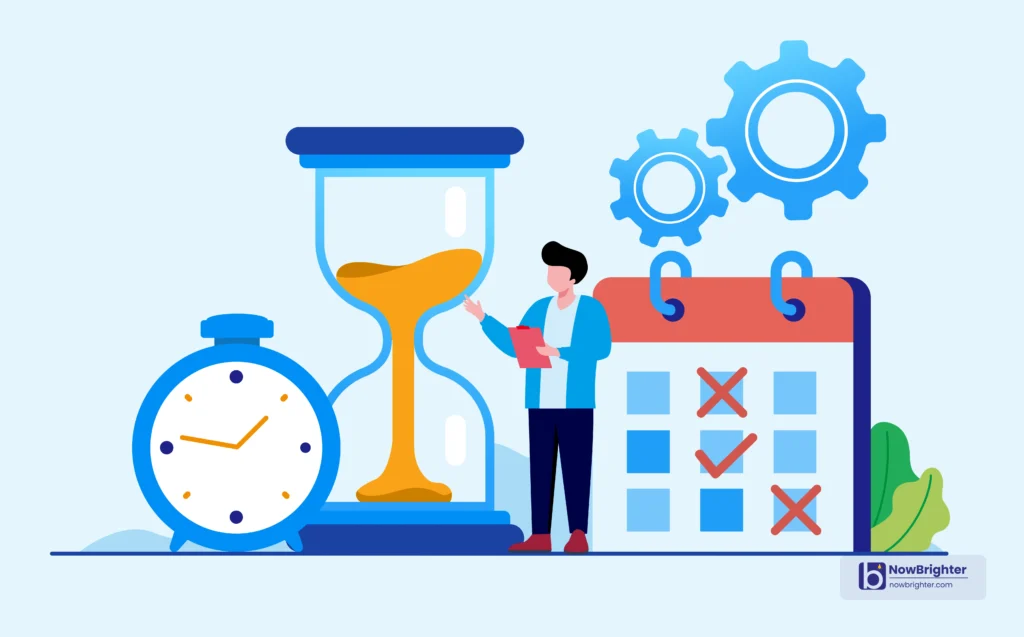What Is Time Management and Why Is It Important?
Time is one of the most valuable resources we have, and yet it is often the most mismanaged. Whether you’re juggling personal responsibilities, professional goals, or both, effective time management is crucial for achieving success without becoming overwhelmed. At its core, time management is about taking control of how you spend your hours in a day, making sure that time is allocated to activities that align with your priorities.
In this blog, we’ll explore what time management really means, why it’s essential for both personal and professional growth, and how to master it. We’ll also touch on the common challenges people face when managing their time and offer practical strategies to help you improve productivity, reduce stress, and find balance in your daily life.

What Is Time Management
Time management is the practice of organizing and planning how to divide your time between various tasks, responsibilities, and activities. It’s not just about cramming as much as possible into your day but about working smarter, not harder. Effective time management helps you prioritize tasks, set goals, and allocate time to what matters most, ensuring that you make the most of your day without feeling overwhelmed.
By mastering time management, you gain control over how you spend your hours, which leads to increased productivity, reduced stress, and better overall well-being. The key lies in aligning your time with your goals and values, ensuring that every moment spent brings you closer to where you want to be in both your personal and professional life.
The Core Principles of Time Management
While time management may seem straightforward, it’s rooted in a few fundamental principles that are critical to getting it right. These core principles guide how we approach our day and manage the competing demands on our time.
Prioritization: Focusing on What Matters Most
At the heart of effective time management is prioritization. Not all tasks are created equal—some are more important or urgent than others. The key to managing time effectively is knowing how to prioritize tasks so that you focus on the ones that will have the greatest impact on your goals.
To prioritize effectively, ask yourself: “Which tasks are essential for my success today?” By focusing on high-priority tasks first, you ensure that you’re always working on what truly matters. For example, tackling a critical project for work is more important than clearing your email inbox or arranging meetings. Prioritization ensures that time is directed toward the activities that offer the most value.
Organization: Structuring Your Day
Organization is another critical component of time management. When your day lacks structure, it’s easy to become distracted or waste time on tasks that don’t contribute to your goals. Being organized means having a clear plan for your day, knowing which tasks to tackle first, and keeping track of deadlines and commitments.
Effective organization starts with creating a to-do list or a schedule. A well-organized day allows you to stay on track, ensuring that you know exactly what you need to accomplish and when. Organization doesn’t just apply to time—it extends to your workspace, your tools, and even your mindset. Keeping things in order reduces the mental clutter that can lead to procrastination and inefficiency.
Discipline: The Power of Consistency
Discipline is often the hardest principle to master but is essential for long-term success in time management. Consistency is key: it’s not just about managing time well on a few productive days; it’s about developing the discipline to stick to your time management practices every day.
Discipline means resisting the urge to procrastinate, staying committed to the schedule you’ve set, and pushing through tasks even when motivation wanes. This consistency helps build habits that eventually make time management feel effortless. Over time, disciplined behavior leads to better results and less stress because you’re consistently getting things done.
Why Time Management is Essential for Success
Now that we’ve covered the core principles of time management, let’s explore why it’s so critical to personal and professional success. The benefits of effective time management go beyond simply getting more done; they impact nearly every aspect of your life.
Improved Productivity and Efficiency
One of the most obvious benefits of time management is increased productivity and efficiency. When you manage your time well, you can accomplish more in less time because you’re focused on high-impact activities. Time management helps you avoid multitasking, which can actually slow you down and reduce the quality of your work.
Efficient time management also means that you’re not wasting time on unnecessary activities. By focusing on what matters most, you’re able to complete tasks quickly and move on to the next, creating a productive flow. This increased efficiency means that you’re not just busy, but actually productive—working on the things that drive results.
Reduced Stress and Anxiety
Time management doesn’t just help you get more done; it also helps reduce stress and anxiety. Poor time management often leads to last-minute work, missed deadlines, and a constant feeling of being rushed. This creates unnecessary stress, which can negatively affect both your mental and physical health.
When you manage your time well, you create a sense of control over your day. You know what needs to be done and when, which reduces the anxiety that comes from feeling disorganized or overwhelmed. The ability to meet deadlines without rushing allows you to maintain a calmer, more focused approach to your work.
Achieving a Healthy Work-Life Balance
One of the most significant advantages of mastering time management is achieving a better work-life balance. Poor time management often results in long hours at work, leaving little time for personal activities, relaxation, or family. When work tasks spill over into personal time, it leads to burnout and dissatisfaction.
By managing time effectively, you can allocate specific hours for work and protect your personal time. This balance ensures that you have time for hobbies, relationships, and self-care, all of which are essential for long-term happiness and well-being. A well-managed day allows you to feel accomplished at work while still having energy left for the things that matter most in your personal life.
Common Time Management Challenges
Even with the best intentions, time management can be difficult to master. Understanding the common challenges that people face can help you identify and overcome them.
Procrastination and Its Impact
Procrastination is one of the biggest enemies of time management. It’s the habit of delaying tasks, often because they seem overwhelming or unpleasant. When you procrastinate, tasks pile up, leading to a last-minute rush that creates stress and reduces the quality of your work.
Overcoming procrastination involves breaking tasks into smaller, more manageable steps, and setting clear deadlines to create urgency. By tackling tasks bit by bit, you reduce the mental barriers that lead to procrastination.
Multitasking and Lack of Focus
Many people believe that multitasking is an efficient way to get more done. However, studies show that multitasking actually reduces productivity and increases errors. When you switch between tasks, your brain takes time to adjust, leading to reduced focus and more mistakes.
The alternative is single-tasking—focusing on one task at a time until it’s complete. This approach increases focus, improves the quality of your work, and allows you to finish tasks more quickly. Managing time effectively means dedicating uninterrupted time to your most important tasks, rather than trying to juggle several at once.
≫ Related Post: What Is Procrastination and Why It Happens?
Effective Time Management Techniques
Time management isn’t just about having good intentions—it’s about using specific techniques to stay on track. Here are some proven time management strategies that can help you stay organized, productive, and focused.
The Eisenhower Matrix: Prioritizing Tasks
The Eisenhower Matrix is a powerful tool for prioritizing tasks based on urgency and importance. It divides tasks into four quadrants:
- Important and urgent: Tasks that need to be done immediately.
- Important but not urgent: Tasks that contribute to long-term goals but don’t require immediate attention.
- Not important but urgent: Tasks that demand immediate attention but don’t contribute to your major goals.
- Not important and not urgent: Low-priority tasks that can be postponed or eliminated.
Using the Eisenhower Matrix helps you focus on tasks that truly matter while avoiding the distractions of less important activities.
Time-Blocking: Structuring Your Day
Time-blocking is a time management technique where you schedule specific blocks of time for each task or group of tasks throughout your day. This method creates structure, ensuring that you allocate focused time for each activity, whether it’s work, meetings, or personal time.
Time-blocking helps reduce distractions and increases focus by giving each task its own dedicated time. For example, you might block out 9:00 AM to 11:00 AM for deep work on a project, followed by a 30-minute block for emails. By scheduling your day, you ensure that important tasks get the time and attention they deserve.
The Pomodoro Technique: Boosting Focus in Short Intervals
The Pomodoro Technique is another popular time management method that helps maintain focus and productivity. It involves working in short bursts—typically 25 minutes—followed by a 5-minute break. After four sessions, or “Pomodoros,” you take a longer break of 15 to 30 minutes.
This technique is particularly effective for tasks that require sustained focus, as it breaks work into manageable chunks. The regular breaks help prevent burnout and maintain energy throughout the day.
The Role of Technology in Time Management
Technology can be both a help and a hindrance when it comes to time management. While digital distractions like social media can eat into your time, there are many tools that can help you stay organized and focused.
Using Digital Tools to Organize Tasks
There are a variety of task management apps that can help you organize your day, such as Trello, Asana, or Google Calendar. These tools allow you to create to-do lists, set deadlines, and prioritize tasks, all in one place. By using digital tools, you can visualize your workload, track progress, and stay on top of deadlines more easily.
Limiting Digital Distractions
While technology is useful for staying organized, it can also be a significant source of distraction. Social media, email, and other apps can pull your attention away from important tasks. One solution is to use focus apps or website blockers that limit access to distracting websites during work hours. Setting boundaries on your tech use helps you stay focused and improves your time management.
Building Long-Term Time Management Habits
Mastering time management isn’t just about applying techniques in the short term—it’s about building habits that lead to long-term success. Here’s how to cultivate habits that will improve your time management over time.
Creating a Daily Routine
Establishing a daily routine is one of the best ways to build good time management habits. A routine provides structure and predictability, helping you stay organized and focused. For example, you might start your day by reviewing your to-do list, setting priorities, and blocking out time for key tasks. A consistent routine reduces decision fatigue and helps you get into a productive flow each day.
Setting Realistic Goals and Expectations
To maintain motivation and consistency, it’s important to set realistic goals. Overcommitting or setting unattainable expectations can lead to frustration and burnout, causing you to fall behind or abandon your time management efforts. Set goals that are challenging but achievable, and adjust them as necessary to reflect changing priorities or workloads.
Conclusion
Time management is about more than just getting more done—it’s about taking control of your life and ensuring that your time is spent on what truly matters. By mastering the core principles of prioritization, organization, and discipline, you can improve productivity, reduce stress, and achieve a healthier work-life balance.
The key to effective time management is consistency—whether it’s through techniques like the Eisenhower Matrix, time-blocking, or the Pomodoro Technique, success comes from building long-term habits that help you stay focused and on track. With the right tools and strategies, you can turn time from a source of stress into a powerful resource that helps you achieve your goals.
















